
Estudios Romanicos
Scope & Guideline
Empowering Researchers with Accessible, Impactful Knowledge
Introduction
Aims and Scopes
- Literary Analysis and Criticism:
The journal publishes works that provide critical insights into classical and contemporary literature from Romance-speaking regions, examining themes, narrative structures, and authorial intent. - Linguistic Studies:
Research focusing on the evolution, variation, and pragmatics of Romance languages, including sociolinguistic studies, neologisms, and diachronic analyses. - Cultural Interactions and Translations:
Estudios Romanicos explores the intersections of cultures through literature and translation, particularly in contexts of migration, identity, and multilingualism. - Historical Contextualization:
The journal emphasizes the importance of historical context in understanding literary and linguistic phenomena, often linking texts to broader socio-political movements. - Interdisciplinary Approaches:
The journal encourages interdisciplinary research that connects literary studies with other fields such as philosophy, gender studies, and environmental studies.
Trending and Emerging
- Plurilingualism and Multilingual Narratives:
There is an increasing focus on the representation of plurilingualism in literature, exploring how multilingual identities shape narratives and cultural expressions. - Environmental and Ecocritical Perspectives:
Emerging themes within the journal include ecocriticism and environmental studies, where literature is analyzed through the lens of ecological consciousness and sustainability. - Gender and Feminist Perspectives:
Recent works are increasingly addressing gender issues and feminist perspectives in literature, highlighting women's voices and experiences across various contexts. - Digital Humanities and New Media:
The intersection of digital humanities with literary studies is becoming prominent, as researchers explore the impact of digital technologies on literature and language. - Cultural Memory and Post-Colonial Studies:
The journal is seeing a rise in submissions that discuss cultural memory and post-colonial themes, examining how historical narratives are constructed and remembered in contemporary literature.
Declining or Waning
- Traditional Historical Narratives:
There has been a noticeable decline in studies centered on strictly historical narratives of literature, suggesting a shift towards more contemporary analyses and interdisciplinary approaches. - Single Language Focus:
Research focusing exclusively on one Romance language is becoming less common, indicating a trend towards comparative studies that consider multilingual and multicultural contexts. - Classical Texts Exclusivity:
Papers that solely analyze classical texts without linking them to modern implications or contemporary readings are appearing less frequently, as scholars seek relevance in today’s socio-cultural landscape. - Rigid Genre Classifications:
The journal is moving away from rigid genre classifications, reflecting a broader acceptance of hybrid forms and interdisciplinary works that challenge traditional boundaries. - Static Theoretical Frameworks:
There is a waning interest in static theoretical frameworks, with researchers favoring more fluid and adaptable methodologies that can accommodate the complexities of modern texts.
Similar Journals

Romanic Review
Pioneering Insights in Romance Language ScholarshipThe Romanic Review, published by Duke University Press, stands as a significant scholarly platform in the field of Romance languages and literature. With its ISSN 0035-8118 and E-ISSN 2688-5220, this journal has been serving the academic community since its inception and will continue its contribution until 2024. Situated in the United States, it has carved out a vital niche in the Arts and Humanities, currently falling within the Q3 quartile as per the 2023 rankings. Although it operates under a traditional subscription model, its focus on disseminating critical and innovative research makes it an indispensable resource for scholars and students alike. The Romanic Review is dedicated to fostering academic discussions that bridge interdisciplinary gaps, making it a cornerstone reference for anyone engaged in the study of Romance cultures, linguistics, and literary studies.
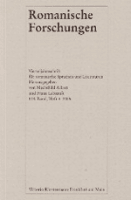
ROMANISCHE FORSCHUNGEN
Unveiling the Nuances of Romance LanguagesROMANISCHE FORSCHUNGEN, published by VITTORIO KLOSTERMANN GMBH, stands as a key scholarly journal in the fields of linguistics and literary studies, focusing particularly on Romance languages and literature. With an ISSN of 0035-8126 and an E-ISSN of 1864-0737, this journal is vital for researchers and scholars seeking to explore and advance their understanding of the nuances within Romance language studies. Operating from its base in Frankfurt am Main, Germany, ROMANISCHE FORSCHUNGEN features a robust publication history from 2002 to 2024. While currently categorized in Q4 within both Linguistics and Language and Literature and Literary Theory for 2023, the journal aims to cultivate a scholarly dialogue that bridges these disciplines, fostering an environment for innovative and critical inquiry. Although not an open-access journal, it serves as a crucial resource for professionals and students dedicated to Romance philology and comparative literature.

Studia z Filologii Polskiej i Slowianskiej
Pioneering Research in Slavic Linguistic PhenomenaStudia z Filologii Polskiej i Slowianskiej is a prominent journal published by the Polish Academy of Sciences, Institute of Slavic Studies, focusing on the rich and diverse field of linguistics and language studies, particularly within the Slavic context. With the ISSN 0081-7090 and E-ISSN 2392-2435, this open-access journal has been a valuable resource for researchers, professionals, and students since its transition to an open-access model in 2014. It features rigorous peer-reviewed articles that contribute to the understanding of linguistic phenomena and cultural narratives across Slavic languages. Recognized within the Q3 quartile of linguistics and language in 2023, it ranks at the intersection of arts, humanities, and social sciences, providing insights that echo through disciplines such as sociolinguistics, psycholinguistics, and philology. In its ongoing publication trajectory from 2011 to 2023, Studia z Filologii Polskiej i Slowianskiej continues to foster academic discourse and collaboration, positioning itself as a key player in the global linguistic community.
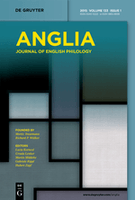
ANGLIA-ZEITSCHRIFT FUR ENGLISCHE PHILOLOGIE
Unveiling the Evolution of the English LanguageANGLIA-ZEITSCHRIFT FUR ENGLISCHE PHILOLOGIE, published by WALTER DE GRUYTER GMBH, stands as a significant periodical in the fields of Linguistics and Literary Theory. With a rich publication history dating back to 1878 and ongoing contributions until 2024, this esteemed journal serves as a vital resource for researchers, professionals, and students interested in the evolution of the English language and literature. Although it does not currently offer open access, its rigorous peer-reviewed articles have secured a respectable standing, ranking Q3 in Linguistics and Language and Q2 in Literature and Literary Theory as of 2023. The journal, located in Berlin, Germany, continues to drive academic discourse and foster scholarly engagement in the intricacies of English philology, making it an essential platform for the latest research and developments in the field.
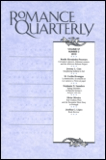
ROMANCE QUARTERLY
Decoding the Interplay of Love and CultureROMANCE QUARTERLY is an esteemed journal published by Routledge Journals, Taylor & Francis Ltd, focusing on critical discussions and innovative research in the fields of Cultural Studies and Literature and Literary Theory. With its inception in 1986, this journal has diligently documented the evolving landscape of romance literature, making significant contributions through interdisciplinary approaches that resonate across literature and cultural scholarship. Holding a commendable position in academic rankings, it is classified in the second quartile for Literature and Literary Theory, and in the third quartile for Cultural Studies as of 2023, highlighting its relevance and impact within these domains. While it operates under a traditional access model, the required scholarly discourse and access to contemporary studies make it a crucial resource for researchers, educators, and students alike. ROMANCE QUARTERLY serves not merely as a platform for publishing but as a vibrant hub for the exploration and analysis of romance narratives, offering invaluable insights into their impact on cultural and societal constructs, surely a must-read for anyone passionate about these subjects.
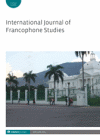
INTERNATIONAL JOURNAL OF FRANCOPHONE STUDIES
Navigating the Intersections of Culture and SocietyThe INTERNATIONAL JOURNAL OF FRANCOPHONE STUDIES, published by INTELLECT LTD, serves as a significant platform for exploring the multifaceted dimensions of Francophone culture and its impact across various disciplines. With an ISSN of 1368-2679 and E-ISSN 1758-9142, this journal supports a diverse scholarly discourse in areas such as Cultural Studies, Gender Studies, History, Linguistics, Literature, and Sociology, among others. As of 2023, it is categorized in Q4 for multiple fields and Q3 for Literature and Literary Theory, underscoring its evolving academic presence. Researchers, professionals, and students can benefit from its rich repository of critical analyses and innovative perspectives that foster an understanding of the Francophone world from a global viewpoint. Although it does not offer open access options, its rigorous peer-review process ensures high-quality contributions that are essential for anyone engaged in Francophone studies. Situated in the United Kingdom, the journal has forged an academic legacy since its inception and continues to be a vital resource for those studying the intersections of language, culture, and identity.
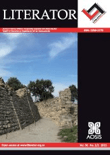
Literator-Journal of Literary Criticism Comparative Linguistics and Literary Studies
Pioneering Open Access Research in Linguistics and LiteratureLiterator - Journal of Literary Criticism, Comparative Linguistics and Literary Studies, published by AOSIS, is a prestigious open-access journal that has been serving the academic community since 1980. With an ISSN of 0258-2279 and an E-ISSN of 2219-8237, this journal provides a vital platform for the dissemination of innovative research in the fields of linguistics and literary studies. The journal proudly maintains an impactful presence within the academia, marked by its 2023 categorization in Q2 for Linguistics and Language and Q1 for Literature and Literary Theory. With impressive Scopus rankings—132nd in Literature and Literary Theory and 448th in Language and Linguistics—it represents the intersection of critical engagement and scholarly inquiry. Literator's commitment to open access fosters inclusivity and broadens the reach of scholarly work, making high-quality research accessible to all. The journal’s scope encompasses critical analyses, comparative studies, and linguistics, inviting contributions that shape and challenge current paradigms. As it converges from 2014 to 2024, Literator continues to illuminate the rich tapestry of literary discourse and linguistic understanding, appealing to researchers, professionals, and students eager to expand their knowledge in these dynamic fields.
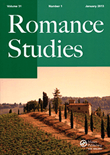
Romance Studies
Fostering Dialogue in the Realm of Romance StudiesRomance Studies is a distinguished academic journal focused on the interdisciplinary exploration of Romance languages, literatures, and cultures. Published by Routledge Journals, Taylor & Francis Ltd in the United Kingdom, this journal offers a vital platform for scholars to disseminate cutting-edge research and critical analyses within the fields of literature and literary theory. With an H-index reflecting its academic influence and a 2023 Scopus ranking placing it in the 47th percentile, Romance Studies serves as an essential resource for researchers, professionals, and students passionate about Romance studies. The journal features a robust selection of articles that span a range of topics, encouraging dialogue and scholarly engagement among readers. Although it does not currently operate under an open access model, its rigorous peer-reviewed articles are instrumental for anyone seeking to enhance their understanding of Romance languages and literature from 1983 to the present.
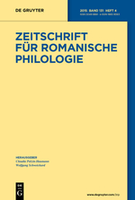
ZEITSCHRIFT FUR ROMANISCHE PHILOLOGIE
Exploring the Rich Tapestry of Romance Languages and LiteratureZEITSCHRIFT FUR ROMANISCHE PHILOLOGIE, published by Walter de Gruyter GmbH, stands as a prominent peer-reviewed journal dedicated to the fields of Linguistics, Literature, and Literary Theory. Established in 1877 and continuing its legacy to the present day, this esteemed journal offers a platform for comprehensive scholarship that explores the intricacies of Romance languages and their literary heritage. With a notable Q1 ranking in Literature and Literary Theory and a Q2 ranking in Linguistics and Language, it has secured its place among leading resources in the humanities. Researchers, educators, and students benefit from its rich historical context and current contributions to the understanding of Romance languages and literature. Though currently not available as Open Access, the journal prioritizes the dissemination of high-quality research, making significant strides in fostering academic dialogue and advancement. Its address at Genthiner Straße 13, Berlin, Germany, situates it in a hub of scholarly activity, bridging the past with contemporary literary discourse.

Carte Romanze
Championing Open Access to Literary ScholarshipCarte Romanze is a prominent academic journal published by Milano University Press, dedicated to the field of literature and cultural studies. With an ISSN of 2282-7447, it offers an invaluable platform for researchers, professionals, and students interested in exploring the rich landscapes of narrative and cultural expression. Since its transition to Open Access in 2013, the journal has championed the dissemination of knowledge, making high-quality research freely available to a global audience. Situated in the historic city of Milan, the journal aims to foster interdisciplinary dialogue and innovation in literary scholarship while maintaining rigorous academic standards. As it continues to contribute to the landscape of contemporary literature studies, Carte Romanze is poised to inspire new scholarly conversations and ideas.